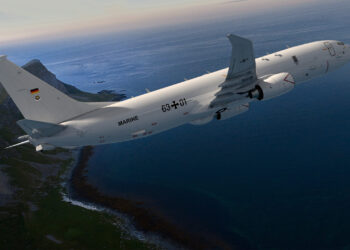US Navy, WASHINGTON: The US Navy plans this autumn to begin a half-year patrol of West Africa as a follow-up to a regional conference in November 2006, in which Gulf of Guinea nations called for greater maritime security cooperation.
Under the new plan, a U.S. ship will act as a floating headquarters and training base. It will cruise the region for five or six months, conducting numerous port visits, deploying training teams and allowing international visitors on board, said Admiral Harry Ulrich, chief of U.S. naval forces for Europe and Africa.
The ship will carry between 200 and 300 personnel – exact numbers will change over time as experts and specialized teams come and go, Ulrich told reporters May 31 after describing the plan to West African diplomats and military officers in Washington.
The ship’s personnel will focus mainly on training and working closely with Gulf of Guinea nations. Ulrich said he actively is seeking participation from European nations with an interest in West Africa as well as nongovernmental organizations. The idea is to create a “floating schoolhouse” in which multinational training teams can train in key activities such as port and oil-platform security, search-and-rescue missions and medical and humanitarian assistance.
“I think there are plenty of opportunities for nations to participate,” Ulrich said.
The ship has not yet been formally identified, and the six-month mission is part of a new concept that the Navy calls Global Fleet Station. The concept allows the Navy to conduct regionwide training and partnership missions involving hundreds of Americans and thousands of international personnel while minimizing the requirements for shore-based, host-nation facilities.
The first Global Fleet Station mission began in late April when the high-speed vessel [HSV] Swift embarked on a summer-long tour to the Caribbean and Central America, with teams scheduled to visit Belize, the Dominican Republic, Guatemala, Honduras, Jamaica, Nicaragua and Panama, according to a U.S. Navy announcement.
For the West African mission, Ulrich said the ship is expected to sail a circuit of Gulf of Guinea nations, including: Senegal, Liberia, Ghana, Sao Tome and Principe, Cameroon, Gabon and Angola. Ulrich said that Nigeria also has expressed interest but has just completed an election and is forming a new government, so discussions on Nigerian involvement likely will take place later this summer.
Ulrich said the Gulf of Guinea naval mission is “closely aligned” with the creation of the new U.S. Africa Command (AFRICOM) announced by President Bush in February to coordinate U.S. military and government interests across Africa. Unlike a traditional military headquarters, AFRICOM is expected to focus on humanitarian, medical and training missions to assist African nations in creating the conditions for political, social and economic stability.
The Navy has been increasing its presence in West Africa for several years, Ulrich said, but added that the new Gulf of Guinea initiative is “in the spirit of AFRICOM.”
The initiative is a follow-up to a November 2006 conference in Benin, co-sponsored by the United States, in which 11 Gulf of Guinea nations agreed to work together to address maritime security issues.
The Gulf of Guinea accounts for almost 15 percent of the U.S. crude oil supply and is rich in other natural resources. But the region also faces numerous challenges, including illegal fishing, piracy, oil theft, criminal activity and illegal trafficking. A priority for U.S. policy includes helping to foster economic and political stability, and good governance as ways to undermine factors that contribute to terrorism and other regional threats.
The Navy’s training teams in West Africa will focus on four main themes:
– Training maritime professionals, such as navy and coast guard crews;
– Improving maritime infrastructure, such as protecting harbors, ships and oil platforms;
– Enhancing maritime “domain awareness,” which concerns being able to monitor and identify illegal or hostile sea traffic; and
– Strengthening maritime interdiction capability, such as being able to stop illegal traffic, as well as being able to conduct search-and-rescue operations or to to help mariners in distress.
Retired Ambassador Peter Chaveas, director the African Center for Strategic Studies in Washington, a Defense Department initiative, said West African officials appear to support the idea of increased U.S. Navy training emphasis. But African nations also are concerned that the concept will not be long-lasting.
“Africans show a great deal of skepticism. We have to … make the case that we’re with them for the long term,” he said.
Ulrich said he intends to follow up the six-month Gulf of Guinea mission with a year-round presence.
China says holds first dual aircraft carrier drills in South China Sea
China has conducted its first military drills with its two operational aircraft carriers in the contested South China Sea, state...









